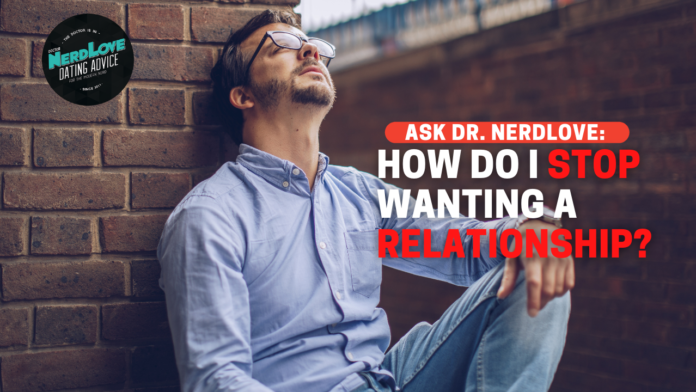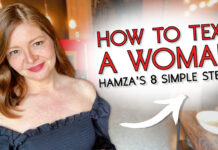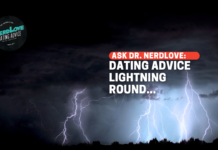Dear Dr. NerdLove:
I write you to ask a question that is on the fringe of what you do, but that I suspect you will have some thoughts about: what do you do when you don’t really want a partner, or at least want to want a partner, but the jerkbrain finds ways to mess things up?
I am a cis-het man who has reached his mid-thirties without having had any physical or romantic relationships. This used to bother me greatly, but after my thirtieth birthday I felt as though a burden was lifted off my shoulders: for the first time it genuinely felt like I would never get into a relationship, and this has definitely had a liberating effect. Even if my cut-off date was entirely arbitrary, my life since has been better off for it.
I should add that I was born with a birth defect that, whilst hardly debilitating thanks to modern medicine, is hardly debilitating (there are people far worse off), it did come at a significant social cost in my youth, and since it is partially hereditary, I opted out having children years ago. I found that women were (to the best of my knowledge) unanimously uninterested in me, and honestly, what progress I have ever made in this field has been negligible.
Now, I cannot claim that I haven’t been fortunate in many ways. Thanks to my being single in my late twenties I was able to go to Europe to get my PhD at a university that, whilst not enormously prestigious, let me study under some of the most relevant specialists in the world in my field. My career has not exactly been flourishing since (thank you, COVID!), but I have been able to combine a steady job with some good university gigs from which I hope something permanent might arise. As far as I’m concerned, if that would happen, I would have what I need to flourish. There are so many other ways that I can be an asset to the people around me, and I have a diverse group of friends and acquaintances that I by and large am happy with, and that I hope I am a net asset to. I therefore don’t ever really see myself returning to dating.
Now, even though I am old my jerkbrain can still be a jerk, and my lack of success with women is still brought up every now and them. Although they have gotten rarer, there are still bleh days where I feel like nothing else than assuming a fetal position and bingeing on Mr. Big ballads. I am old enough to realize that when I’m feeling heartache or Weltschmerz over the situation there are usually other reasons for this. Lack of professional progress, negative developments in other social relations or even poor nutrition or sleep can all manifest themselves as a girlfriend-shaped hole to my mind. These episodes have become rarer as I have grown older, which I am grateful for. Even so, when they happen, they might still linger for at least a few days, time that I would much rather spend working on grant proposals, lectures or articles.
As you yourself has said on numerous occasions: whilst pain is inevitable, suffering is optional. Do you have any suggestion how do I would go about to opt out?
Yours sincerely,
Ulraunt the Old Buzzard
So this is interesting to me, in part because when we talk about people dealing with their jerkbrain, what we’re usually talking about are ways people’s anxieties manifest about things they’re afraid of happening. In some ways, anxiety can be an early warning system, trying to alert you to a problem that’s either in progress, or likely to occur. Other times, however, it’s like a cruel opponent, taunting you with the hints that the things you’re most afraid of are happening, about to happen or have already happened and now you’re about to suffer the consequences for having not noticed yet.
What I don’t often hear are people describing their jerkbrains as something reminding them of a thing they actually want. Or, I guess wanted, in your case. While that’s not entirely unknown – see, also, anyone who’s ever tried to break an addiction or a particularly pernicious habit – it’s not often that it’s a case of someone asking for help in giving up.
Which is why I have a question for you, UOB: do you actually not want to date and to not have these desire bother you? Or is it that some part of you is still holding onto hope, and you wish you could squash that?
It’s one thing when someone is single for longer than they’d prefer, and they don’t want to be. This is when I would suggest much of what you do already: make sure you have a fulfilling life, hobbies and passions that feed your soul, a community you feel part of and a social circle of people who love and support you.
However, there’s a difference when one’s opted out… and especially in the way you seem to have, and how it affects you.
Part of the problem here is that you play pretty fast and loose with relevant details, such as how your birth defect – whatever it may be – affected you, socially. In and of itself, this is hardly uncommon; a lot of folks who have chronic conditions from birth, handicaps or deformities have traumatic experiences based on how people treated them. Although, honestly, a lot of folks who don’t have birth defects or chronic conditions have had similar traumas, especially ones stemming from junior high and high-school; that’s one of the most frequent commonalities I see in the clients I work with and the letters I get. And it does make me wonder if you’ve ever actually looked into getting treatment for your trauma. Not, mind you, that not wanting a relationship is something that needs to be fixed – God knows there’re plenty of asexual and aromantic folks who aren’t interested in romantic or sexual relationships who’re happy as clams. However, addressing that trauma with a professional might well change a lot of things for you that may well improve the overall quality of your life.
This lack of detail also makes me wonder if the underlying issue is that you look at what you think you need in order to date and decided that you don’t want to do the work involved. That’s a legitimate choice. It’s not one I agree with, for obvious reasons, but it my agreement doesn’t make it more or less valid or legitimate; it’s just one that I have a differing opinion on. However, I find that, in general, if that’s a choice you’ve made and the reason for that choice, then it’s better to be honest about that, instead of cloaking it in “well, I had no other choice but this.” Stick with me; this will be relevant in a second.
So, let’s be clear: what you’re asking for is, ultimately, the opposite of what I do here. But since you’re asking me, I’ll give you an answer. But here’s the thing: you’re looking at this the wrong way. The problem you’re having – such as it is – is that you’re treating this as though it were a desire that can and should be extinguished. It’s the idea that humans can just turn off part of what makes us human – the desire for love, connection, and so on. This is something that folks have insisted other people should be able to do, often with heartbreaking and tragic results; all you have to do is look at the LGBTQ people who’ve been forced into conversion therapy to make them less queer or less trans. It doesn’t work; all that happens is that you get miserable queer and trans folks who try to pretend that they’re not queer or trans any more before something breaks.
Here’s where being more straightforward about your choices is important: for all intents and purposes, what you’ve done is taken a vow of chastity and celibacy. That may not be how you think of it, but that’s what you’ve done. And like Catholic priests or many sects of Buddhist monks, this is not something one does because it’s easy, but because it’s (in theory) in the service of some greater good or higher purpose. Part of why this is an important difference is that those who’ve chosen that vow are doing so with the acknowledgement that they’re making a sacrifice. That means, in part, acknowledging that this isn’t something easy to do, but rather something they have to work with (and against) every day. And while yes, the eventual goal – especially in Buddhism – is to overcome that desire, overcoming it doesn’t mean eliminating it, but rather to not let it control you.
So treating this as something that can be squashed for good is ultimately only going to make you miserable. Since you don’t seem to be on the ace/aro spectrum, the desire for that particular form of connection is likely going to be with you for life. Recognizing that makes a significant difference… and that affects your relationship with those desires. By treating this as a sacrifice that you’ve chosen, for whatever reason, then the desires don’t become something to eliminate, but rather something to manage.
And if those moments of feeling longing are something to be managed, then the way you manage them is by treating them as you would other inconvenient emotions. That is: you don’t try to repress or eliminate them. All this does is squeeze them down, like compressed gas. That, in turn, all but guarantees that at some point – likely the most inconvenient time possible – the container’s going to rupture, messily and all over the place. Instead, what you do is allow yourself to just feel those feelings. You note them and name them – “ah, yes, there’s that desire for a relationship, there’s that desire for sex.” – and let it pass through you without the need to actually do anything about them.
One practice that can help with this is mindfulness meditation. Part of a meditation practice is learning how to notice your feelings without dwelling on them and learning to gently redirect your attention elsewhere. In your case, it would be, say, back towards working on your latest grant proposal or writing your next lecture.
It is significant, however, how much these moments coincide with other areas of professional disappointment. The overlap of professional frustrations with your romantic frustration seems to imply that the two are correlated. That, to me, suggests that part of why these feelings linger is because you still see it as something you’ve failed at or that you lack, rather than something you’ve chosen for yourself. Again, that would make me wonder if you might be better served by addressing the social cost you mentioned earlier with a counselor or therapist. While that isn’t going to magically change how you feel, one way or another, it may, at the very least, make things easier to manage when you can accept this as a sacrifice you’ve willingly chosen, rather than something you’ve “had” to accept because you had no other choice.
But at the end of the day, this is your decision. If that’s what you’ve chosen, that’s what you’ve chosen, and learning to let those inconvenient feelings be and redirecting your attention elsewhere will be helpful for you.
Good luck.
Dear Dr. NerdLove:
I really like this girl, but I fumbled a bit on our last date and blurted out that that I wanted to hold her hand. She didn’t really seem too sure, so I backpedaled and did some more backpedaling and apologizing later over text in a way that definitely made me look like an idiot. Now her reply times are slowing more and more and I can’t meet up with her again until the week after next.
I genuinely don’t know what to do, because mentioning it again would not help, but just carrying on doesn’t either, because she is just taking longer and longer to reply and I would’ve lost her interest by before I can meet her again. What do I do??
Yours sincerely,
Frustrated.
Y’know Frustrated, it’s amusing that you blurted about wanting to hold her hand, seeing as I quite literally just answered a different question about how to ask for consent – including holding someone’s hand. I’d suggest you go and read that one after you finish this; it’ll give you some pointers on how to use your words when you’re looking to escalate with someone physically. Even if it’s as simple as wanting to hold somebody’s hand.
But let’s take a moment and examine how you got here. The issue isn’t that you blurted out that you want to hold her hand. That can be a little awkward in the moment, sure, but that’s not automatically a dealbreaker. Everyone – and I do mean everyone – has been nervous on dates at one point or another. Just about everyone has also had moments where they’ve said or done stupid or cringey shit when their nerves went out of control and they were in danger of exploding into a cloud of flop sweat and anxiety. Anyone who’s worth dating is going to have sympathy and understanding for those moments. Hell, many will even see it as adorable; it’s a moment of unfiltered vulnerability and honesty. The idea of someone being so hoping that things go right and so wanting to have a perfect first date is kinda sweet, when you get right down to it.
Just as importantly, those moments aren’t always going to be dealbreakers. If someone’s into you, it takes more than just some momentary awkwardness to kill that attraction dead. However, the key to making that particular leap isn’t to avoid awkward moments or unfortunate mishaps. It’s understanding how to recover from them. This is where things went wrong for you.
Straight talk, Frustrated: the issue isn’t that you got nervous and fumbled a moment. The issue is that you compounded that initial awkward moment by underlining it repeatedly, then drawing even more attention to it later on. Once could’ve been overlooked. Doing it twice meant that you’ve now made a momentary flub into the defining moment of the date – and made it clear that you weren’t sailing past that any time soon. That is ultimately why things have been devolving with her. I rather suspect that she’s now worried that there’s either going to be a third moment of abject apologizing, or that if you get nervous and have another brain-fart, things are going to end up being just as awkward and you’re going to be begging her to help soothe your jangled nerves again. That’s a lot, and it’s understandable that someone who isn’t necessarily all-in might decide it’s better to do the slow fade.
Here’s the thing: if you had handled the dismount better, you wouldn’t be in this situation. The key to handling a flub or awkward moment on a date is to address it in a confident and attractive way, not to backpedal like a circus bear on a tricycle.
As I’ve said before, I’ve had any number of awkward, cringe or otherwise just embarrassing moments when I’ve been on dates or even approaching someone. These have ranged from sudden bouts of gastric distress while on a date – made worse in one case by the fact that it was my first date with someone that had previously Friend-Zoned1 me – to literally choking on my own saliva while trying to chat up a pair of women at a bar.
In all of those cases, I may have wanted to jump in a hole and pull it in after me, but I soldiered on regardless. I didn’t try to pretend that $EMBARRASSING_THING didn’t happen; instead I addressed it directly and played it off with humor. What was important was that I called out and acknowledged the awkwardness, without losing my shit or freaking out. Calling out the awkward helps dispel the awkward; it says “ok, yes, this happened, let’s not get weird by pretending it didn’t.” The humor serves to set the tone; it showed that I’m confident enough to poke gentle fun at myself while saying “yup, that was not my finest hour.” The fact that I got people to laugh with me smoothed things over and meant that this was just an amusing anecdote, rather than some horrific and embarrassing thing that would haunt everyone for the rest of time.
In your case, there’re a few things you could’ve done (besides, y’know, not backpedal repeatedly and then again over text). My suggestion would be to play it for humor; not in the sense of “ha, I was just kidding! Unless…” but in the sense of using humor to underline it. One option would be to play with way you accidentally blurted things out. For example, you might pause and say “… oh shit, did I say that out loud?” or “So, I guess I should warn you that my inner monologue quits being inner when I’m nervous.” Or you might play with the obvious awkardness of it all and say “Ok, in my defense, that sounded way cooler in my head.” Another option – especially if you could calm yourself and lower your register – would be to change the framing of the situation, by saying “I didn’t say you could. I just said I wanted to.”
While these might not necessarily be worthy of someone’s tight five at the Chuckle Hut, they would at least defuse the moment and turn that awkwardness into something you can both laugh at.
Unfortunately, that didn’t happen. Instead, the scramble, fumble and repeated apologies just told her that maybe you weren’t really ready for this and every embarrassing incident would get compounded this way. And again, I stress that it’s the repeated apologies that were likely the stake in the heart of this particular scenario.
So what do you do now? Well… unfortunately, you’re asking how to unscrew this particular pooch, and that pooch ain’t getting unscrewed. Unless you have access to a Flux Capacitor or the TARDIS, there’s nothing to do except to take this as the learning opportunity it is and to apply those lessons to the next time you’re out on a date.
It’s certainly possible that you might see her again when you’re available, but I wouldn’t be waiting with sandwiches by the phone for her to text back. You can put the offer for another date out there, but I’d recommend assuming that it’s not going to happen and focus on someone new. It sucks, and I’m sorry, but making mistakes is part of dating. But like the man says: why do we fall down? So we can learn how to get up again.
Oh, and pro tip: the next time you find yourself getting nervous on a date, there’re two things you can do. First: control your breathing. Slow your breathing down – inhale for a count of four, hold it for a count of four, exhale for a count of six. This will force your heart to slow down and calm you. Next: reframe the moment in your head: you’re not nervous, you’re excited because things are going to go amazingly. Yeah, you’ll still have those jitters and racing brain… but the context will be different. And that, in turn, will make it much easier to recover from when you metaphorically stub your toe.
Good luck.
- Standard disclaimer: there is no Friend Zone; there are only people who don’t want to date or fuck you. The term is used here as shorthand and a term of art. [↩]
www.doctornerdlove.com







